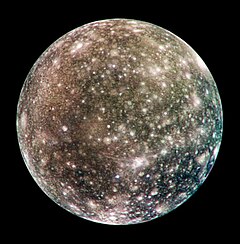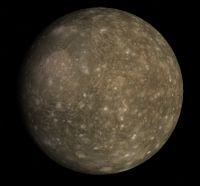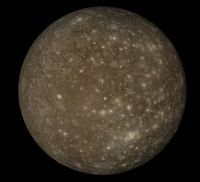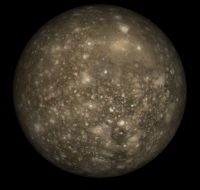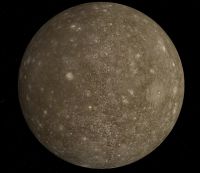Difference between revisions of "Callisto"
(Added image.) |
(Added link, image, content for Voyager1Jupiter.zip.) |
||
| Line 4: | Line 4: | ||
!bgcolor="lightsteelblue" colspan="2" align="center" |Callisto | !bgcolor="lightsteelblue" colspan="2" align="center" |Callisto | ||
|- | |- | ||
| − | |colspan="2" align="center"|[[Image: | + | |colspan="2" align="center"|[[Image:Callisto.jpg|240px]] |
|- | |- | ||
|colspan="2" align="center"|'''Callisto in Orbiter 2016 with D3D9 client''' | |colspan="2" align="center"|'''Callisto in Orbiter 2016 with D3D9 client''' | ||
| Line 16: | Line 16: | ||
!bgcolor="lightsteelblue" colspan="2"|Planetary mean orbits | !bgcolor="lightsteelblue" colspan="2"|Planetary mean orbits | ||
|- | |- | ||
| − | |width="30%"|Epoch||align="right" width="50%"| | + | |width="30%"|Epoch||align="right" width="50%"|1979.12391832712 (14 February 1979 061605 UTC) |
|- | |- | ||
| − | |width="30%"|Semimajor axis (a)||align="right" width="50%"| | + | |width="30%"|Semimajor axis (a)||align="right" width="50%"|1882672300.0498 m |
|- | |- | ||
| − | |width="30%"|Eccentricity (e)||align="right" width="30%"|0. | + | |width="30%"|Eccentricity (e)||align="right" width="30%"|0.00749408660030182 |
|- | |- | ||
| − | |width="30%"|Inclination (i)||align="right" width="30%"| | + | |width="30%"|Inclination (i)||align="right" width="30%"|2.042629678° <br> (0.0361742120612421 radian) |
|- | |- | ||
| − | |width="30%"|Longitude of the ascending node (LAN, ☊)||align="right" width="30%"| | + | |width="30%"|Longitude of the ascending node (LAN, ☊)||align="right" width="30%"|339.4829654° <br> (5.92509550057735 radian) |
|- | |- | ||
| − | |width="30%"|Longitude of periapsis (ϖ)||align="right" width="30%"| | + | |width="30%"|Longitude of periapsis (ϖ)||align="right" width="30%"|698.8083584° <br> (12.19650669467 radian) |
|- | |- | ||
| − | |width="30%"|Mean longitude (L)||align="right" width="30%"| | + | |width="30%"|Mean longitude (L)||align="right" width="30%"|839.9757519° <br> (14.6603425078708 radian) |
|- | |- | ||
!bgcolor="lightsteelblue" colspan="2"|Selected physical parameters | !bgcolor="lightsteelblue" colspan="2"|Selected physical parameters | ||
|- | |- | ||
| − | |width="30%"|Mean radius||align="right" width="30%"| | + | |width="30%"|Mean radius||align="right" width="30%"|2403000 m |
|- | |- | ||
|width="30%"|Mass||align="right" width="30%"|1.08×10<sup>23</sup> kg | |width="30%"|Mass||align="right" width="30%"|1.08×10<sup>23</sup> kg | ||
| Line 46: | Line 46: | ||
|width="30%"|LAN||align="right" width="30%"|0 | |width="30%"|LAN||align="right" width="30%"|0 | ||
|- | |- | ||
| − | |width="30%"|Note||align="right" width="30%"|*Elements given are from Callisto.cfg ( | + | |width="30%"|Note||align="right" width="30%"|*Elements given are from Callisto.cfg (Voyager1Jupiter.zip) |
|} | |} | ||
| Line 62: | Line 62: | ||
|- | |- | ||
!Add-on!!Source!!Version!!Author!!Type!!Release Date!!Compatibility!!Wiki article | !Add-on!!Source!!Version!!Author!!Type!!Release Date!!Compatibility!!Wiki article | ||
| + | |- | ||
| + | |[https://www.orbiter-forum.com/resources/voyager-to-jupiter-jupiter-moons-enhancement-pac.4947/ Voyager to Jupiter / Jupiter moons enhancement pac]||O-F Resources||2004-08-29||BigJimW||Scenery||30 August 2004|||| | ||
|- | |- | ||
|[https://www.orbiter-forum.com/resources/orbiter-2003-p2.5433/ Orbiter 2003-P2]||O-F Resources||031217||martins||Orbiter Download||17 December 2003||Orbiter 2003-P2|| | |[https://www.orbiter-forum.com/resources/orbiter-2003-p2.5433/ Orbiter 2003-P2]||O-F Resources||031217||martins||Orbiter Download||17 December 2003||Orbiter 2003-P2|| | ||
| Line 74: | Line 76: | ||
Callisto-orbiter2002p3.jpg|<center>Callisto in Orbiter 2002P3</center> | Callisto-orbiter2002p3.jpg|<center>Callisto in Orbiter 2002P3</center> | ||
Callisto-Orbiter2003P2.jpg|<center>Callisot in Orbiter 2003P2</center> | Callisto-Orbiter2003P2.jpg|<center>Callisot in Orbiter 2003P2</center> | ||
| + | Callisto-Voyager1Jupiterzip-Orbiter2003P2.jpg|<center>Callisto from ''Voyager1Jupiter.zip'' in Orbiter 2003P2</center> | ||
Callisto - July 8 1979 (38926064465).jpg|<center>Callisto as seen by [[w:Voyager 2|Voyager 2]]</center> | Callisto - July 8 1979 (38926064465).jpg|<center>Callisto as seen by [[w:Voyager 2|Voyager 2]]</center> | ||
</gallery> | </gallery> | ||
Revision as of 03:24, 9 September 2024
 | This natural satellite related article is a stub. You can help Orbiterwiki by expanding it.
Callisto is the outermost of Jupiter's four Galilean Moons, and has been a part of Orbiter since it was added in Orbiter 2002. Callisto is the second largest moon of Jupiter just behind Ganymede, and is the third largest moon after Ganymede and Titan. And Callisto is just about the same size as the planet Mercury. Callisto was discovered independently by w:Simon Marius and w:Galileo Galilei in 1610, Marius having seen it slightly before Galileo, and the name given by Marius is the one that we use today. Callisto in OrbiterCallisto joined Orbiter with the release of Orbiter 2002. At that time its orbit was governed by the Callisto.cfg file, then governed by Vsop87.dll file at the release of Orbiter 2005. The orbit of Callisto is not locked into an orbital resonance with Io, Europa, and Ganymede, which are in a 1:2:4 resonance. It revolves about 1.88×106 kilometers from Jupiter, eccentricity of 0.0074, and an inclination of about 0.25°. The moon has a mass of 1.08×1023 kilograms and a radius of about 2.4×106 km. Orbiter versions and add-ons for Callisto.
| ||||||||||||||||||||||||||||||||||||||||||||||||||||||||||
